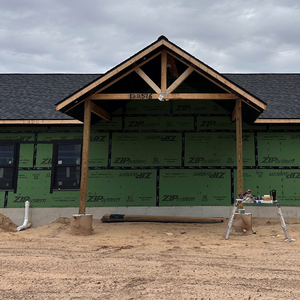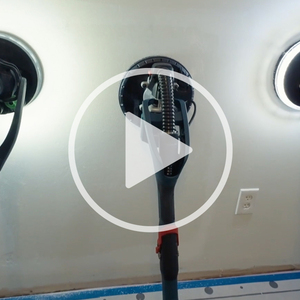*
Ted, I have some additional ammo, I mean, information for you if you find your customers becoming difficult. Let me know if you want it and I’ll post it here. (Private e-mail somewhat defeats the purpose of this bbs.) By all means, keep us posted.
RKM: curious to know why you didn’t answer my question under Ted’s original post.



















Replies
*
Rich, thanks for the offer of further info. I would love to know your thoughts. I went back and reread the original thread and as your first post was quite early, I never responded to let you know that I was taking your advice, and the advice of some others I'am sure, to get in an inspector that specializes in window and stucco leaks. I'll certainly find one in this area as there have been a lot of problems of this sort here. Also, I appreciate your advice to wait until I have a more complete picture before I offer any fixes. Thanks for your interest and advice, ted
*Rich:You mean this part?>RKM, let's assume the windows are the source of the leak and that the arch did not provide window details. >Because the arch is hired to provide a professional service is it not incumbent upon him to be thorough? And if, by omission, he failed to provide a complete set of papers, isn't he liable for not rendering services as stipulated? Wouldn't something as simple as "Design me a house" constitute such a stipulation? >Bear with me, I'm just being tangental. I'm thinking there is some code that governs here.Maybe I didn't get to it because I missed it? Anyway, assuming this is the question, the answer isn't immediately obvious. There is indeed a "standard of reasonable care" that professionals would be judged by in a court of law. This would be based on what other similar professionals in this particular marketplace, at this particular time, provide as a standard practice for this particular service. In other words, if most other architects in the Oakland Hills aren't detailing windows, then the architect in question wouldn't be judged as having a lower standard of care. The other issue that makes it unclear is that I am unsure what the extent of services to be provided were. For example, "design me a house" doesn't necessarily imply full construction documentation, but might be satisfied with design sketches. If the architect were hired merely to provide sufficient documentation to obtain a building permit, then presumably the duties were adequately discharged, since the house was certainly built with a permit. Saying to an architect, "design me a house" would be a little like saying to a contractor "build me a kitchen." So what's a reasonable response? That answer your question?Richard
*RKM,Brilliant answer. Yes, that is what I was thinking and you answer my questions to satisfaction.However, as all things go, your words below beget a thought associated with the further information I offered to Ted.i This would be based on what other similar professionals in this particular marketplace, at this particular time, provide as a standard practice for this particular service. In other words, if most other architects in the Oakland Hills aren't detailing windows, then the architect in question wouldn't be judged as having a lower standard of care. Interestingly enough, this seems to allude to a criteria used in determining the definition of the term "Industry Standards". Actually, in respect to construction contractors, your words are contradictory to the definition as interpreted by the state of CA. IOW, CA state does not recognize doing (methods & materials) in like fashion what others are doing as an adequate defense of one's business practices. While this refers to contractors it is indeed peculiar that, when applied to architects, such is not the case.
*Ted, it seems there is a deficiency in the property. That this defect is not apparent by reasonable inspection makes this, by definition, a latent defect. Under Section 337.15 of the Standard CA Codes, the owner has up to 10 years to seek redress from the contractor. This 10 year period begins upon discovery of the latent defect. This means you Ted are on the hook for up to 15 years after occupancy had been granted. This has been established by precedence and upheld numerous times so don't try to appeal this.The above is worthy of mention because it lets you know where you stand, but it also can help establish your defense against a recalcitrant client. (Simply requesting & recieving bids for remediable work from other contractors would qualify your client as this.) Further, if your client appears to not submit to your expert professional opinion, it is evidence of recalcitrance. (An aside: I do not remember the exaxt Part, but under the CA state B&P Code, it is expected (I'm paraphrasing now) to enter into contract agreements with goodness and fairness. To reiterate, if the client appears to not defer to your opinion you may be able to establish the client as a "sick owner" on this point alone. This "sick owner" label is important because legal precedence in this very matter can be used to your defense to show this client as uncooperative and nonresponsive to your reasonable and genuine interest in providing a solution. Kinda' lets you off the hook.)Further, while defects, whether patent or latent, are sometimes unavoidable, you have ample precedence to establish that you, in fact, did what was reasonable and in accordance to established building methods and materials. Regardless whether a defect exists or not. (Read that over and over until it begins to sink in.)The answer lies in the legally accepted definition of the term "Industry Standards". Too true, the term has been used and abused, mostly misunderstood, but there is an established legal definition. This may be your ace card.There are four criteria used to establish the definition of "Industry Standards". 1)UBC, w/ ANSI, ASTM as reference2)Mfg recommendations3)Trade associations4)Plans & SpecificationsYour ace card may be defined as follows: well, I did follow the UBC (No.1) but the window mfg didn't provide details (No.2) nor did the arch (No.4). So, because I adhered to No.1 and because the methods and materials I employed in installing and flashing the windows was consistent with No.3 I feel that I satisfied a reasonable expectation of providing my construction services. Further, the work in question falls within the normal scope of my work and was performed to the highest level of expertise.Conclusion: seek mediation by crafting your own settlement. If unsuccessful, arbitration is the next step. I'm not a lawyer, I just got tired of being stepped on. Employ a deputy inspector, I don't think it's too late. Consult a construction attorney, or, at least, a law library.
*RKM,DOH! Kindly make deletions & additions to that last paragraph in my post(#3) Delete "contradctory", add "in agreement". Delete "does not", add "does". Delete entire last line.
*Rich, thanks for the wealth of information and insight. I will try to craft a solution as I know that that is the high road. As I have said before, I have been at this for over 30 years w/o mediation, arbitration, or litigation and hope to go out that way. I can tell by your posts that you have had at least one brutal one and I know the feeling. It does seem that everything comes down to the GC and the more responsible you are the more it all comes down to you. At the end everyone walks but you. I guess that's the nature of the game, but it does seem that responsibility is not always equitibly distributed.
*Yeah, they walk alright. But only for a time. Everyone gets what's due. You can bask in the knowledge that you did--whatever it took--what was right.Nope, while I've been named in lawsuits five different times over the years, nothing seriously bad has come my way. It's just that when I realized a really messy lawsuit may be out there I better get proactive and try to head it off, or to at least recognize it before it blew up in my face. So I started to study construction law.A CM told me to plan every job as if a lawsuit is to come--a real messy one. There have been two instances where my job logs kept me out of court. One of those got really ugly and all 17 defendents were horribly damaged. Could have been me in there too save for my paper work.Please be sure to let us know how this progresses.
*Rich, it looks like you've been wise in advance of trouble; I wish I could say the same. This was an unusual job in that the architect was a personal friend and he and the owner were having difficulties from before I even bid the job. As a result I filled roles I shouldn't have. I think I knew better, but tried to force a positive result hoping for the best. Life is always providing lessons. Anyhow, thanks for all your helpful input. I think it will be some time before I get this all sorted out, but I'll work toward a positive result and keep you posted on my progress.